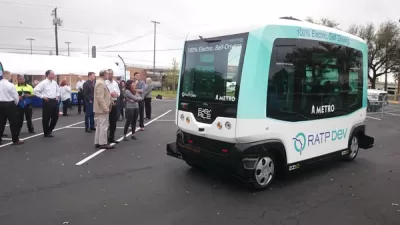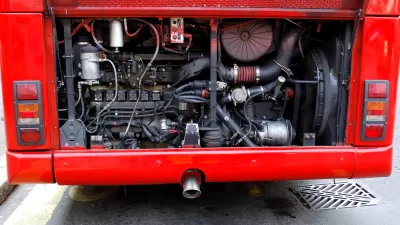While it might be easy to convince public officials to sell driverless technology as a flashy solution to mobility deficits—the math still doesn't justify the expense.

"Add Arlington, Texas to your mental list of cities conducting local tests of driverless shuttles," according to an article by Greg Roberts.
"On March 28, the City Council of Arlington, Texas approved a six-month lease of two EZ10 driverless shuttles from the French startup EasyMile, with a six-month option to renew," adds Roberts. "The vehicles, which can transport up to a dozen people at a time, will operate on a fixed course between parking lots and venues in Arlington’s entertainment district."
The question posed by Roberts in light of this news, however, is whether such test programs are worth the cost. In Arlington's case, the city is paying $270,000 to lease the two vehicles for two months. If the city had simply paid for two Ford Transit passenger vans of similar size and paid drivers to occupy the vehicles, the price would have come out to about $113,000 over the course of six months. Roberts notes that the gap between the two systems would be narrowed if extended for a full year.
The point: driverless technology is not yet a low-cost option, much less a cost-saving solution for cities and regions, like Arlington, looking for a way to improve public transportation options.
FULL STORY: Cities Now Exploring Autonomous Buses – But Is It Worth It?

Alabama: Trump Terminates Settlements for Black Communities Harmed By Raw Sewage
Trump deemed the landmark civil rights agreement “illegal DEI and environmental justice policy.”

Planetizen Federal Action Tracker
A weekly monitor of how Trump’s orders and actions are impacting planners and planning in America.

The 120 Year Old Tiny Home Villages That Sheltered San Francisco’s Earthquake Refugees
More than a century ago, San Francisco mobilized to house thousands of residents displaced by the 1906 earthquake. Could their strategy offer a model for the present?

In Both Crashes and Crime, Public Transportation is Far Safer than Driving
Contrary to popular assumptions, public transportation has far lower crash and crime rates than automobile travel. For safer communities, improve and encourage transit travel.

Report: Zoning Reforms Should Complement Nashville’s Ambitious Transit Plan
Without reform, restrictive zoning codes will limit the impact of the city’s planned transit expansion and could exclude some of the residents who depend on transit the most.

Judge Orders Release of Frozen IRA, IIJA Funding
The decision is a victory for environmental groups who charged that freezing funds for critical infrastructure and disaster response programs caused “real and irreparable harm” to communities.
Urban Design for Planners 1: Software Tools
This six-course series explores essential urban design concepts using open source software and equips planners with the tools they need to participate fully in the urban design process.
Planning for Universal Design
Learn the tools for implementing Universal Design in planning regulations.
Clanton & Associates, Inc.
Jessamine County Fiscal Court
Institute for Housing and Urban Development Studies (IHS)
City of Grandview
Harvard GSD Executive Education
Toledo-Lucas County Plan Commissions
Salt Lake City
NYU Wagner Graduate School of Public Service




























